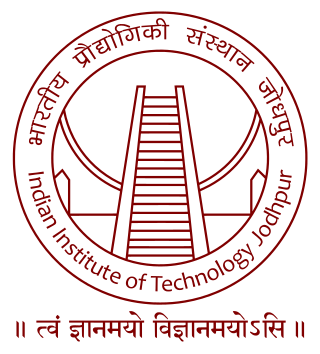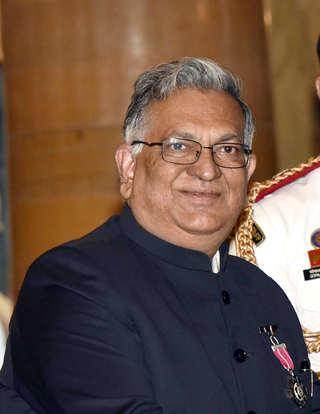
Indian Institute of Technology Kanpur is a public institute of technology located in Kanpur, Uttar Pradesh, India. It was declared an Institute of National Importance by the Government of India under the Institutes of Technology Act. IIT Kanpur is ranked among the most prestigious academic institutions in India.

The Indian Institute of Technology Bombay is a public research university and technical institute in Mumbai, Maharashtra.

Veermata Jijabai Technological Institute (VJTI) is a state funded college located in Mumbai, Maharashtra, India. Founded in 1887 and formerly known as the Victoria Jubilee Technical Institute, it adopted its present name on 26 January 1997. VJTI is an academically and administratively autonomous institute, but it is affiliated to the University of Mumbai. The institute is financially supported by the Government of Maharashtra.

Anil Kakodkar, is an Indian nuclear physicist and mechanical engineer. He was the chairman of the Atomic Energy Commission of India and the Secretary to the Government of India, he was the Director of the Bhabha Atomic Research Centre, Trombay from 1996 to 2000. He was awarded the Padma Vibhushan, India's second highest civilian honour, on 26 January 2009.

Indian Institute of Technology Dhanbad is a public technical university located in Dhanbad, India. IIT Dhanbad is an Institute of National Importance, and is ranked among the premier engineering institutions of India.
Faqir Chand Kohli was a co-founder and the first CEO of TCS Tata Consultancy Services, India's largest software services company. He was also associated with other companies within Tata Group, including Tata Power Company and Tata Elxsi, and had been President of Indian Information Technology (IT) services advocacy body NASSCOM. He was a recipient of the Padma Bhushan, India's third-highest civilian honor, in 2002 for his contributions to the Indian software industry. He is referred to as the "Father of the Indian IT Industry", for his contributions to the establishment and growth of the Indian IT industry.
The Indian Institutes of Technology (IITs) are the premier autonomous public technical and research universities located across India, founded under the leadership of Pandit Jawaharlal Nehru.

Indian Institute of Technology Jodhpur is a public technical university located in Jodhpur in the state of Rajasthan in India. It is one of the eight new Indian Institutes of Technology (IITs) established by the Ministry of Human Resource Development, Government of India under The Institutes of Technology (Amendment) Act, 2011 which declares these eight IITs as well as the conversion of the Institute of Technology, Banaras Hindu University to IIT. The Act was passed in the Lok Sabha on 24 March 2011 and by the Rajya Sabha on 30 April 2012.

Vinod K. Singh is a Rahula and Namita Gautam Chair Professor of Chemistry at IIT Kanpur. He is also the Director's Chair Professor at IISER Bhopal & adjunct Professor at NIPER Hyderabad. He is currently the President, Chemical Research Society of India and the Chairman, Governing Council of IACS Kolkata.

Uday B. Desai is an Indian academician and the founding director of Indian Institute of Technology Hyderabad. He is a Professor Emeritus in Electrical engineering Chancellor ICFAI Dehradun, Chancellor Anurag University, Hyderabad Honorary Distinguished Professor Plaksha University and a Strategic Consultant for TSDSI. He served as the director of IIT Hyderabad from June 2009 to July 2019, and is credited for taking it to rank among the top 10 engineering colleges in India in the NIRF engineering ranking. He was mentor director of IIT Bhilai from May 2016 to February 2017 and mentor director for IIIT Chittoor 2013–2018.
Vijay N. Gupchup is an educationist, academician, researcher and considered an expert in the field of civil engineering and structural engineering.

Institute of Chemical Technology (ICT) is a public deemed university in Mumbai, India. The institute also has campuses at Bhubaneswar, Odisha and Jalna,. It is focused on training and research in the fields of chemical engineering, chemical technology, and pharmaceutical sciences. It was established in 1933 and was granted deemed university status in 2008, making it the only state-funded deemed university in India. On 12 February 2018 it was given the status of Category 1 institute with graded autonomy by the Ministry of Human Resource Development and the University Grants Commission (India). It is also an institute with a special status as mentioned in SECTION IV of the Report of the Empowered Expert Committee in 2018.

Deepak B. Phatak is an Indian computer scientist and academic, and a recipient of the Padma Shri Award for his contribution in science and technology in 2013. He is known for his notable work for upgrading Aakash, advertised by its manufacturer as the 'world's cheapest tablet'. In 2009, he was ranked one of the 50 most powerful people in India.
V Ramgopal Rao is an Indian academic currently serving as the Group Vice Chancellor of Birla Institute of Technology and Science, Pilani for campuses located in Pilani, Dubai, Goa, Hyderabad and Mumbai. He was previously the Director of IIT, Delhi for six years during 2016-2021.
Suhas Pandurang Sukhatme is an Indian scientist, teacher, author and a former Chairman of the Atomic Energy Regulatory Board of the Government of India, known for his expertise in heat transfer and energy technologies. He was honoured by the Government of India, in 2001, with the fourth highest Indian civilian award of Padma Shri.

Kasturi Lal Chopra was an Indian materials physicist and a former director of the Indian Institute of Technology, Kharagpur. He was the founder of the Thin Film Laboratory at Indian Institute of Technology, Delhi and the Microscience Laboratory at IIT, Kharagpur and held several US and Indian patents for his research findings. Author of a number of books on thin film technology, he was a recipient of Shanti Swarup Bhatnagar Prize, the highest Indian award in the science and technology categories. The Government of India awarded him the fourth highest civilian honour of the Padma Shri, in 2008, for his contributions to science and engineering.
Devang Vipin Khakhar is an Indian chemical engineer and the former director of the Indian Institute of Technology Bombay. He is known for his pioneering researches on polymerization and is an elected fellow of all the three major Indian science academies viz. Indian Academy of Sciences, Indian National Science Academy and National Academy of Sciences, India as well as Indian National Academy of Engineering. The Council of Scientific and Industrial Research, the apex agency of the Government of India for scientific research, awarded him the Shanti Swarup Bhatnagar Prize for Science and Technology, one of the highest Indian science awards for his contributions to Engineering Sciences in 1997.

Yogesh Moreshwar Joshi is an Indian chemical engineer, rheologist and the Pandit Girish & Sushma Rani Pathak Chair Professor at the Indian Institute of Technology, Kanpur. He is known for his studies on metastable soft matter and is an elected fellow of the Society of Rheology, Indian National Science Academy, Indian Academy of Sciences, and Indian National Academy of Engineering. In 2015, the Council of Scientific and Industrial Research, the apex agency of the Government of India for scientific research, awarded Joshi the Shanti Swarup Bhatnagar Prize for Science and Technology for his contributions to Engineering Sciences. In 2023, he received prestigious J C Bose fellowship constituted by the Science and Engineering Research Board, Government of India.

Sudhir Kumar Jain is the incumbent and 28th Vice-Chancellor of Banaras Hindu University. He is a civil engineer by education and has formerly served three terms as the founding director of the Indian Institute of Technology Gandhinagar. He has carried out intensive research and development in the fields of seismic design codes, dynamic of buildings, and post-earthquake studies. Beside these, Jain has actively participated in teaching, research activities and development in earthquake engineering focused on developing countries. He is an elected fellow of Indian National Academy of Engineering. He was also elected a member of U.S. National Academy of Engineering (2021) for leadership in earthquake engineering in developing countries.













